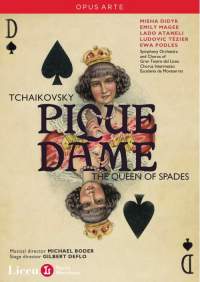Tosca. Zurich Opera, April 9th 2009. Production: Robert Carsen. Cast: Emily Magee (Tosca), Jonas Kaufmann (Cavaradossi), Thomas Hampson (Scarpia). Conductor: Carlo Rizzi. Further information
here.
All the ingredients were there: As starry cast, a stylish director as well as a beautiful (and sold-out) auditorium. Nevertheless, the evening never really took off.
Canadian director
Robert Carsen apparently was inspired by Cavaradossi´s remark to Tosca “like Tosca in the theatre” after she instructs him on how to play dead. Thus, his Tosca is a
theater-in-the-theater production, a concept Robert Carsen has tried earlier with his
Hoffmann´s Tales in Paris, and generally a more intellectually rewarding than emotionally thrilling staging concept. Furthermore, this apparently is not a new production, as it appears it has been seen earlier in Barcelona, though information in this regard is not exactly forthcoming from the Zurich Opera website or magazine (read: it seems to be non-existent).
Combined with the creation of stylized Hitchkock-Hollywood images, the result is a production, which emphasizes form over substance, unfortunately draining it of drama. The overly stylized movements by Tosca, artificially coordinated with the music beneath a moving spotlight during the confrontation with Scarpia virtually draws the tension out of this, the perhaps central scene of the entire opera, briefly reminiscnet of the extreme aesthetism of Robert Wilson.
In brief, we are in a theater. As
Act 1 opens we look at an operatic theater from the back of the stalls – plenty of chairs, Cavaradossi decorating the auditorium, while the curtain (of the theater-within-the-theater) finally goes up under the Te Deum to display Tosca in full stage regalia. For
Act 2 we move backstage to a smoking Scarpia beneath a large VIETATO FUMARE sign, staring at a large painting of Tosca. All in a very aesthetic mix of period costumes on a virtually bare (back)-stage.
Tosca is a stylized 1950´s hollywood diva. A superficial diva, who enjoys both the spotlight (literally) and the attention from Cavaradossi as well as Scarpia while distractedly looking at the programme notes of this evenings Tosca performance..Theatre within theatre indeed.
While Cavaradossi, the only genuine character in this set-up, is the real victim: Presumably intended to be younger than Tosca (he is in real life as well), he is the only one displaying genuine emotions in his unconditionally love for Tosca and sings about his loneliness to a pitch-black auditorium from the naked stage in
Act 3, into which Tosca finally jumps with her audience now vanished. It is both aesthetic and stylish. However, compelling music theater it is unfortunately not.
Despite the presence of the undisputed leading Cavaradossi of the day in
Jonas Kaufmann. What does he not have? Nothing it seems. In looks and acting, he is the perfect romantic hero. He even has that barytonal glow to his voice, which does make him push for the top (as Plácido Domingo always has), but has the benefits of gaining more punch to his interpretation.
Thomas Hampson´s lyric baritone does not, on paper, seem ideal for Scarpia, though he projects the dramatic lines of the part surprisingly well. As a villain, however, he does not convince, though I am not sure Scarpia is really intended as such in this production, rather as a man, fighting with another man over a woman.
The vastly underrated
Emily Magee made her role debut as Tosca, and sings the part better than anyone I can imagine today,
Karita Mattila apart. The lack of emotional connection with her character may probably mainly be attributed to Carsen´s approach of the work, and it would be interesting to see her in another production. At the Met, perhaps, where her debut has been
more than overdue for about a decade?
Effective, though not overly detailed, playing from the orchestra under Carlo Rizzi.
An evening, where, unfortunately the sum was somewhat less than the individual parts put together.
The bottom line (scale of 1-5, 3=average):
Jonas Kaufmann: 5
Thomas Hampson: 4
Emily Magee: 4-5
Robert Carsen´s staging: 4
Carlo Rizzi: 3-4
Overall impression: 4















